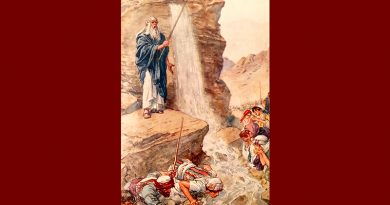The Editorial: Anglicanism for Dummies
By C. Peter Molloy
I HAVE BEEN thinking a lot lately about what it means to be ‘Anglican.’ Now to be perfectly clear I don’t think being an Anglican is an end in itself. When I think of those things that describe and define me, Anglican is at least sixth or seventh down the list. But nonetheless, it is the only one in that list that is presently undergoing serious debate as to its meaning. And having found Anglicanism as a young adult and since being formed and ordained to minister within that tradition has been the context of my vocation as an adult, I am not indifferent to the current identity crisis within Anglicanism.
So, what does it mean to be an Anglican?
Is it a formal institutional connection to a specific wider Anglican body? And if so, which one? Historically, certainly the case could be made for the Church of England, but is that really where the centre of Anglicanism lies today? With the rapid decline in numbers and relevancy of the C of E within England, and the explosive growth of the church in the Global South it would be hard to make that case, on any grounds other than formal historical ones.
Or is it a liturgical style? But again, if so, which one? At this point in our history the breadth of worship has broadened considerably, especially within the last half century.
Increasingly within traditional Anglican churches, being an Anglican involves keeping in step with current Anglican thinking. Theological conservatives within the Anglican Church of Canada are routinely denied parishes or preferment for holding what was mainstream Anglican thought until recently. Even in the Church of England, which was diligent about honouring traditional positions, that compact seems to have been abandoned of late. Has being an Anglican been reduced to self-assertion? Surely there has to be more.
Recently there was an interesting episode in the ongoing saga of As the Anglican World Turns, which provided an opportunity for us to consider the essential character of Anglicanism. Following the amendment of the marriage canon to allow for same-sex marriage in the Anglican Church in Aotearoa, New Zealand and Polynesia (ACANZP), there was a brief hopeful period where it seemed like a new and more irenic resolution of the divide between theological conservatives and liberals might be possible.
The Archbishop of Sydney, Dr Glenn Davies, was invited by the Primates of ACANZP to discuss a proposal that allowed for ‘Distinctive Co-existence.’ Modelled in part after the overlapping Anglican jurisdictions in Europe, this proposal, according to Dr. Davies, would if accepted “[avoid] the querulous controversies that have beset our Anglican brothers and sisters in North American and, more recently, in Scotland.” Indeed he hoped that “Aotearoa and Polynesia could lead the way in expressing generosity of Spirit to those who find themselves unable to accommodate the new consensus. This would be a model not only for other provinces but for the Anglican Communion as a whole.”
Well, long story short, his proposal was rejected. Quelle surprise. In their response, the Archbishops of ACANZP intimated that Dr. Davies had not taken the time to understand the unique character and history of ACANZP, that he did not ‘understand or respect our history,’ that a necessary element of being ‘an Anglican’ in New Zealand ‘required’ a recognition of the historic relationship between the ‘colonised and coloniser,’ and to ‘face into this history.’ As such they could not ‘recognise a Church as Anglican which did not encapsulate this 200 years of relationship history.’ There were a few personal jabs thrown in there for good measure, but you get the gist.
Now I think we can be somewhat sympathetic to this view that any ministry should understand and be sensitive to the particularities of its context. But is this really a necessary element of Anglican identity? Can we say that someone is not an Anglican if they do not possess this particular perspective?
Here is the interesting part (finally!). In his godly and gracious response to the ACANZP Primates Dr. Davies regrets that his proposal came across as reinforcing colonial intervention, and points to the heart of Anglicanism, which transcends cultural differences. He writes “Growing up as an Anglican in Australia, I have treasured the Bible, the Thirty-Nine Articles and the Book of Common Prayer, which to me express the essence of being Anglican.” This seems to be an elegant solution to the problem of Anglican identity. While it points to certain formal markers it also gives substance to the Anglican project. It cuts past all of the political division of our time and says that these things are the heart of Anglican identity: the word of God, our theological distinctives, and the pattern of worship that faithfully expresses both. Brilliant.
All of us at TAP want to wish you the Happiest of Christmases and God’s blessing upon you and your families and ministries in the year to come. TAP




